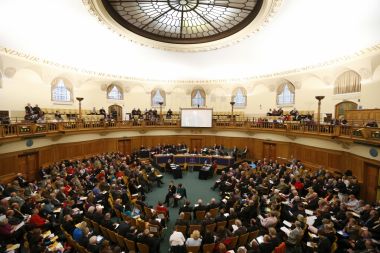Services for suicides could be legalised in Church of England

Centuries-old Church tradition could be changed as the Church of England is set to debate the burial of suicides in Canon Law next month.
According to current Church law, clergy must bury "the corpse or ashes of any person decease within his cure". However, article B38 of Canon Law stipulates that those who have "died unbaptised, or being of sound mind have laid violent hands upon himself, or have been declared excommunicated" are exempt.
Ministers are instead asked to use an alternative burial service in these cases. However, no such service has ever been approved by the General Synod and so clergy are forced to create their own versions or use the approved service – an act which is in breach of Canon Law.
Rev Sally Hitchiner, chaplain at Brunel University and founder of Diverse Church, tweeted in November: "I don't know a single priest who doesn't bury suicides. Can find you lots of examples of equally outdated civil laws."
This is all despite calls over several decades to reform the law. A campaigner for change, Canon Michael Parsons, told the Mail on Sunday that the change would shift the perception that the Church is "hostile" towards those who commit suicide, and would give clergy freedom to perform ceremonies which are already common practice. He added that most clergy are primarily concerned with looking after the families of those involved, and making sure they are aptly cared for.
However, though reforms are expected to receive majority support next month, they do face some opposition.
According to the Mail, an unnamed senior member of Synod said: "The Church has always opposed suicide on the basis of the commandment Thou Shalt Not Kill, and that includes yourself."
Former Government Minister Lord Tebbit, who has been vocal in his opposition of assisted suicide, told the Mail that the Church "is in danger of getting into a muddle".
"We can take a merciful view of people who kill themselves while the balance of their mind is disturbed. But we are now looking at cases in which people who appear to be quite sane want to take their own lives," he argued.
"The Church should think again."











